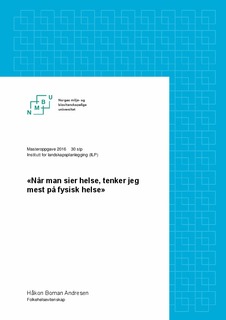| dc.contributor.advisor | Ihlebæk, Camilla | |
| dc.contributor.author | Andresen, Håkon Boman | |
| dc.date.accessioned | 2016-08-26T08:42:36Z | |
| dc.date.available | 2016-08-26T08:42:36Z | |
| dc.date.issued | 2016-08-26 | |
| dc.identifier.uri | http://hdl.handle.net/11250/2401924 | |
| dc.description.abstract | Bakgrunn: Mange ungdommer trener i dag på treningssenter. Tidligere studier viser at det på treningssentrene finnes en sterk fysisk orientert helsediskurs. Dette til tross for at dagens mest brukte helsedefinisjoner anerkjenner helse som et komplekst begrep bestående av fysisk, mental og sosial helse. Det finnes en del forskning på ungdommers helse og selvopplevde helse. Likevel vites det lite om hva unge gutter forstår helse som.
Formål: Formålet med studien er å undersøke hvordan gutter i slutten av tenårene som trener på treningsstudio forstår helsebegrepet og hvilke faktorer de mener påvirker helsen.
Metode: Det er brukt kvalitativ metode til å innhente datamateriale fra seks gutter i alderen 17-19 år som trener på treningssenter. Individuelle livsverdensintervjuer er gjennomført. Datamaterialet er transkribert og analysert ved bruk av systematisk tekstkondensering.
Resultater: Informantene forstår helse i stor grad som et objektivt, fysisk anliggende, hvor fysisk aktivitet og kosthold både er og skaper helse. Imidlertid, når informantene reflekterer over helsebegrepet, dukker det opp en bredere forståelse av helse. Informantene trekker frem subjektiv, personlig velvære som viktig for helsen. De snakker om viktigheten av balanse mellom fysisk og mental helse. Det kan se ut som informantene delvis forstår det som er bra for den mentale helsen, som dårlig for den fysiske helsen, og omvendt. Ved å utvise selvdisiplin og å være strukturert, mener informantene man vil kunne balansere det sunne og usunne, og slik få en god fysisk og mental helse.
Konklusjon: Informantenes intuitive forståelse av helse er påvirket av fitnessdiskursens helseforståelse, men når de reflekterer over helsebegrepet kommer det fram en helseforståelse som ligner på den «norske» helseforståelsen. Informantene utviser da det som kan beskrives som en delvis nyansert og fleksibel helseforståelse. Ungdom som trener på treningssenter som ikke reflekterer over helseforståelsen sin, vil muligens ikke forstå helse som noe annet enn et fysisk anliggende. Fremtidig forskning og folkehelsearbeid anbefales dermed å fokusere på en mer holistisk helseforståelse, for å påvirke den intuitive helseforståelsen til å inkludere mer enn fysisk helse. | nb_NO |
| dc.description.abstract | Background: Many adolescents work out at fitness centers today. Former research shows there is a strong, physically oriented, health discourse at the fitness centers, even though most health definitions in use today acknowledge health as a complex concept, including aspects such as physical, mental and social health. Research has been done on adolescents’ health and self-perceived health, but little is known about what adolescent males comprehend health to be.
Purpose: The purpose of this study is to explore how adolescent males who work out at a fitness center comprehend health, and what factors they consider to affect health.
Method: A qualitative method is used to collect data material from six boys in the age 17-19 years, who work out at a fitness center. Individual life-world interviews have been performed, and the data material has been transcribed and analyzed using systematic text condensation.
Results: The informants comprehend health as an objective, physical issue, where physical activity and nutrition is considered both to be health and create health. Still, when the informants reflect on the health concept, a more nuanced comprehension evolves, where they emphasize subjective personal well-being as important for health. They talk about the importance of balance between physical and mental health. It seems the informants partly understand that which is positive for mental health, is negative for physical health, and vice versa. The informants seem to believe that by being disciplined and structured, it is possible to balance between healthy and unhealthy, and thus create good physical and mental health.
Conclusion: The informants’ intuitive comprehension of health is affected by the fitness discourse. When they contemplate the concept of health, a holistic health comprehension similar to the “Norwegian” health comprehension emerges. A health comprehension which can be described as partly nuanced and flexible is portrayed by the informants. Adolescents working out at fitness centers who do not contemplate their comprehension of health might not understand health as anything more than a physical issue. Future research and public health campaigns are recommended to increase their focus on a more holistic approach to health, so as to influence adolescents’ intuitive health comprehension to include more than physical health. | nb_NO |
| dc.language.iso | nob | nb_NO |
| dc.publisher | Norwegian University of Life Sciences, Ås | |
| dc.subject | Folkehelse | nb_NO |
| dc.subject | Folkehelsevitenskap | nb_NO |
| dc.subject | Ungdom | nb_NO |
| dc.subject | Helse | nb_NO |
| dc.title | "Når man sier helse, tenker jeg mest på fysisk helse" | nb_NO |
| dc.type | Master thesis | nb_NO |
| dc.subject.nsi | VDP::Social science: 200 | nb_NO |
| dc.source.pagenumber | 81 | nb_NO |
| dc.description.localcode | M-FOL | nb_NO |
